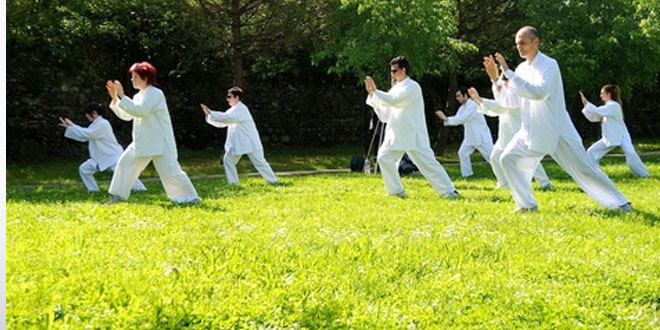
Tai Chi may have more health benefits than you know
Tai Chi, the traditional exercise that focuses the mind and the body, may do more for you than just being a workout.
Researchers from Taiwan and China have found that tai chi can lower the risk of falling for seniors and it may improve the health of those who suffer from heart disease.
Doing tai chi can strengthen the extremities of seniors, says a study from Taiwan. This can help prevent seniors from falls.
In the study researchers from Taipei Medical University compared the effectiveness of tai chi to a physical therapy called “lower extremity training,” or LET, which involves leg-strengthening exercises, in reducing falls.
Two groups of participants aged 60 and above were recruited. The participants had all received medical attention for falling. One group was given tai chi classes and the other received LET sessions.
At the end of 6 months it was found that those who practiced tai chi were significantly less likely to experience an injury caused by a fall compared to those who did LET. But that wasn’t all. The benefits of tai chi was seen even after a year later.
Many existing health conditions can contribute to the risk of a fall including arthritis specialist, heart disease, muscle weakness, vision and balance problems, and dementia. Practising seven days a week at home also gave even greater results.
The team also saw that cognitive function improved more in the tai chi group than in the LET group.
Commenting on how seniors can incorporate tai chi into their lives, Mau-Roung Lin, one of the co-authors of the study, advises that seniors should start by learning tai chi and its movements in a class, but also practise the movements at home at least once a day. The study is published in the Journal Of The American Geriatrics Society.
In China, researchers say that the traditional exercise may help those who are recovering from heart disease, high blood pressure or stroke.
Researcher Chen Pei-Jie and his team from Shanghai University of Sport in China reviewed 35 studies, which looked at 2,249 participants in total from 10 different countries.
The data showed that for individuals with cardiovascular disease, practising traditional Chinese exercise such as Tai chi, Baduanjin and Qigong helped to reduce systolic blood pressure – which measures the pressure in the arteries when the heart muscle is contracting – by more than 9.12mm Hg on average.
They also found improvements in diastolic blood pressure – which measures the pressure in the arteries when the heart muscle is resting – was reduced by more than 5mm Hg on average.
The team believes that the results of their meta-analysis on blood pressure suggest that traditional Chinese exercise could help to lower the risk of stroke by up to 41%, and coronary heart disease by up to 22%.
The results also showed a small but statistically significant reduction in the levels of bad cholesterol and triglycerides – a type of fat found in the blood that can increase the risk of heart disease.
In addition, those that lived with cardiovascular disease but practised Chinese exercises also showed an improvement in overall quality of life and reduced levels of depression in comparison to the control group.
The study didn’t find any significant improvement in heart rate or aerobic fitness level, or an improvement in participants’ scores on a general health questionnaire.
The researchers did acknowledge that their study had some limitations, such as finding out the possible long-term effects of traditional Chinese exercise.
However, the team, who have been studying the effects of traditional Chinese exercise on disease for over five years, still concluded that their study demonstrates the positive effect that these forms of exercise can have on patients with cardiovascular disease, and are now planning further research to confirm their results. The findings were published in the Journal of the American Heart Association.
Source: AFP Relaxnews

